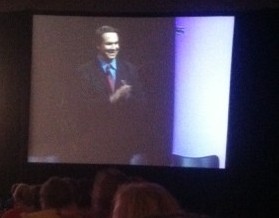I confess I loved Three Cups of Tea when I read it. I was moved, buoyed with optimism and hope, really thinking that it is still possible to effect great change with one idea, one promise, one decision.
Around the same time, I also read Kabul Beauty School, followed up with The Kite Runner and A Thousand Splendid Suns. All of these books for me painted a vivid mental picture of the people of Afghanistan and Pakistan, devoid of media stereotypes and uninformed perceptions.
The “power of the book” really hit me during this particular reading phase, reminding me how books help keep us honest as readers, making us think beyond headlines and newsfeeds; how books provide the original virtual learning experiences that build understanding, empathy, and motivation by something other than our own frame of reference, especially if we do not have the gift of travel to see it with our own eyes—despite the best documentary video or online image gallery.
Last week at the TLA annual conference, Greg Mortenson was the conference’s closing speaker. I had actually heard from a former colleague who had seem him before that he wasn’t necessarily a polished presenter, but looked forward to what he would share about his Three Cups of Tea experiences, likely merging his vision and work with the conference’s theme of “crossing boundaries.”
Mortenson was surprisingly articulate, and covered a lot of ground in his talk. After offering a highlighted version of his journey and work in Three Cups, Mortenson spoke to a change in attitude among the younger “me generation” to “Generation We,” a “collective community,” focused on giving of oneself instead of remaining self-involved. He also discussed the difference between how we as a society perceive learning from our elder generation as not vital, in stark contrast to the roles elders play in the middle east—when asked about how much time American children spend with/talk to their grandparents, he said survey results on average were lower than 5%, whereas in Pakistan, the percentage was 99%.
I left the session once again engaged with a desire to “become the change” I wish to see, motivated to incorporate more service learning strands into wherever they make sense, along with those “soft skills” of collaboration and social responsibility.
…………….
Before heading out the door this morning, I caught a snippet of a CNN interview about the emerging controversy surrounding the authenticity of Mortenson’s book; one phrase that stuck in my ear was that despite the book containing “dubious tales,” the interviewee Peter Bergen did say that no one can argue that building schools for girls in Afghanistan and Pakistan is “great.”
Needless to say, the ironic coincidence of hearing Mortenson speak just days before this story breaking that his book could contain not just little lies but a pretty big one that acts as its dynamic crux has left me feeling very ambivalent.
These allegations also touch on how vigilant (or not vigilant) fact checking is on memoirs. What’s funny about memoir is that it has to be true to maintain its integrity and real value, but it uses narrative as the method to convey the details of memory—and a narrative is basically a story that shares a retelling of events, either true or untrue, or both.
It just may be that Greg Mortenson’s memoir is a narrative composed from personal experience that has become mythologized, a very “compressed version” of the truth with a strong dash of epic storytelling overshadowing all the finer details.
It was a pretty incredible story to begin with—after failing an attempt to climb a mountain, a man stumbles upon his destiny? I have to believe that we want to believe and need to believe in stories such as these, since stories are so fundamental to our own narrative as human beings on this planet. Stories and narrative make meaning and give meaning, especially when our own observations and experiences don’t match up with what we think or feel, or hope.
If I had read this with my student book club, or even read excerpts with a class, I would have to ask the question: So what’s the more important thing here—that his book has had a very positive impact despite potential fabrications, or do these false facts cancel out the inherent power the book had—or still has?
What a goldmine of essential questions you could discuss that could tie into academic integrity, plagiarism, and even a wider exploration of fiction versus nonfiction:
What determines the truth?
What is the connection between fact and fiction?
What is the connection between story and truth?
At what point does embellishment obscure the truth?
…One of the last things Mortenson said in his talk was “When it is dark you can see the stars.”

